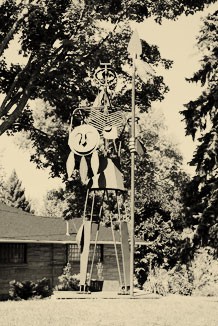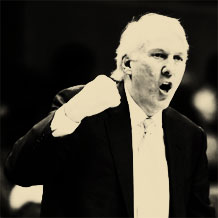
Peter Gregory teaches Joy Thru Movement ©
November 28, 2010
While living in Chicago, I would pass by parks and see tai chi in action – people moving slowly and gracefully.
It looked interesting. But it struck me as yet another practice you find in the city but not in surburbia. I wasn’t even sure what tai chi was: a yoga type thing? Something akin to karate?
Recently I came across a promotional pamphlet at the Mellow Brew Cheesecake House in Dyer while attending a Rambler meeting and thought I’d give it a shot.
Peter Gregory, an accredited practitioner based in Crown Point, was kind enough to let fellow Rambler Bob and me sit in and observe his T'ai Chi Chih! Joy Thru Movement © weeknight classes. Peter has been set up to teach full time in Indiana for a little more than a year.
Originally from Highland, he grew up struggling with obsessive-compulsive disorder and anxiety like many people. He dealt with inner turmoil, rapid thoughts and general unease. He was intrigued by yin-yang principles in college and began studying Taoist and Eastern philosophy.
In the early 1990s in Chicago, Peter started practicing tai chi chuan, a martial art, in pursuit of peace of mind. While it was effective, he didn't have the stick-to-it-tiveness, and even though he found it relaxing, he wasn't feeling the flow of chi. Chi is an ancient concept of energy that reportedly travels through channels in the body.
Peter saw footage of T’ai Chi Chih on TV and was mesmerized by the flow and calmness of the movements. He wanted in.
A quick aside: Justin F. Stone originated T’ai Chi Chih in 1974 with that idea that everyone, including seniors, can learn it.
Unlike tai chi chuan, T’ai Chi Chih is not a martial art. With Stone’s elimination of the martial aspect, its peaceful nature emerged.
Rather than 108 movements that are done in a sequence, Stone came up with 19 movements that are performed in repetition. It is all about circulating and balancing the energy in the body. Stone also simplified the footwork to create more relaxed stances. To best sum it up, T’ai Chi Chih is like a moving meditation.
Back to Peter: About 1995 or 1996, a flier for T’ai Chi Chih led him to take classes. The practice produced changes in him, transforming his thoughts and outlook, and his stress went away, he said.
"A lot of things that we run for help for we are really capable of healing ourselves," Peter said.
He decided to become a teacher and became certified in 1996 in New Jersey. He gained teaching experience early on when his mentor got injured and passed off classes to him.
Peter teaches throughout Northwest Indiana at various park and recreation facilities, senior centers and YMCAs. Bob and I met with him and his students at Wilbur Wright Middle School in Munster.
"This is the exact opposite of exercise,” Peter said. “Exercise is about going harder and faster and doing more. A good T’ai Chi Chih movement, the more you have a flow of the chi energy is by being softer, going slower and doing less."
The first thing a student learns is how to move. That takes about eight weeks. The key to incorporating the movements is repetition. That, of course, improves proficiency.
A major reason for dropouts is an inability to slow down. After all, we are conditioned to rush through things.
"I don’t want to offend anyone, but multitasking is overrated, and (T’ai Chi Chih) really helps to focus the mind," Peter said.
The serenity in that room was palpable as I watched Peter and 10 of his students perform T’ai Chi Chih. An occasional basketball from the gym next door would hit the door or there would be a periodic burst of loudness, but they were definitely locked into their concentration. I gained an understanding of the art, and my interest grew.
The most common benefits reported from performing T’ai Chi Chih are more energy, balance and calmness, as well as relief from asthma and insomnia.
You can practice alone or with others anywhere. Just keep in mind: Results come from practice.
For more information, contact Peter Gregory at (219) 671-4636, psgreg24@gmail.com or http://www.taichichih.org.








